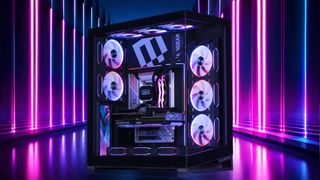MAINGEAR is trying to make building gaming PCs better for all of us, and I'm here for it
Whether pre-built or building your own, this new way of thinking could change the game entirely.

What you need to know
- PC builder MAINGEAR has revealed its attempts to standardize rear-facing motherboard connections to make building gaming PCs much easier and cleaner looking.
- MG-RC is the company's patented design to move cabled connections to the rear of the motherboard.
- MAINGEAR has partnered with MSI to use its Project Zero motherboard in its first PC using the new design.
Building gaming PCs is about to get a whole lot better if the efforts of MAINGEAR and its partner MSI are anything to go by. Announced at CES 2024, MAINGEAR has a new patented design it's calling MG-RC which, in simple terms, moves the cabled connections on a motherboard to the back.
This means not only a cleaner look in the finished PC, since the only visible cables will be from the power supply to your graphics card, but also a much less irritating time actually building the thing.
CES 2024 marks a milestone moment for MAINGEAR as we redefine gaming PC aesthetics and performance industry-wide. MG-RC represents MAINGEAR’s relentless pursuit of innovation in the PC gaming space, and embodies our mission to create the ultimate gaming experience through superior products and exceptional service.
Wallace Santos, CEO of MAINGEAR.
Besides making the front of the PC look much cleaner, and making it so much simpler to route and fix cables by moving them to the back, there are other benefits. Less cables on the front also means less air turbulence, resulting in a better overall airflow through the case. Better airflow equals better cooling performance.
MAINGEAR has submitted a patent for MG-RC which you can view here, but it isn't just about the company's own PCs. MAINGEAR wants this to become a new standard and is working to push the industry forward and adopt this new way of building PCs, as naturally, it isn't something that will just automatically become compatible with existing PC case design.
Two new PCs in partnership with MSI and Phanteks

MAINGEAR has also partnered with MSI to use its new Project Zero motherboard and, in one case, the MAG Pano M1000 PZ White case to house it all. The MAINGEAR Zero Drop will be coming later this month on January 24 in limited quantities, using the benefits of MG-RC and packing the newly announced NVIDIA RTX 4070 Ti Super.
The other PC being shown off at CES is the NV9 Zero (pictured above) which is expected to become available at some point during Q1 of this year. This uses the new Phanteks NV9 PC case, designed to be compatible with MG-RC and again, is based around the MSI Project Zero motherboard.
The NV9 will also be MAINGEAR's first time putting an LCD display onto one of its PCs, and internally will house an Intel Core i9-14900K, NVIDIA RTX 4080 Super, and an enormous 420mm radiator, also from Phanteks, to keep things cool.
Why has it taken this long to build PCs this way?

I've built quite a lot of PCs in my time, but I don't think I could ever truly say I enjoyed the process. Between bleeding every time I've had to install an I/O shield, to the relentless swearing trying to feed tiny cables through and connect them to the motherboard, it's a process.
But, like all good PC builders, I do take pride in the appearance of my machine. There comes a point though I just give up, because cables are cables, and there's just no hiding them. The idea behind this is music to my ears, and I really can't believe it's taken this long.
The back of the motherboard is basically dead space, and the back of the PC case is where we hide (or tidy if you're more motivated than I am) the cable mess anyway, so it makes perfect sense. It's easier to route, easier to connect, and leaves you with a clean looking front. I see absolutely no drawbacks here, and hopefully the efforts of MAINGEAR, MSI and Phanteks catch on quickly. I'm not building another PC until I can do it like this.
Get the Windows Central Newsletter
All the latest news, reviews, and guides for Windows and Xbox diehards.

Richard Devine is a Managing Editor at Windows Central with over a decade of experience. A former Project Manager and long-term tech addict, he joined Mobile Nations in 2011 and has been found on Android Central and iMore as well as Windows Central. Currently, you'll find him steering the site's coverage of all manner of PC hardware and reviews. Find him on Mastodon at mstdn.social/@richdevine
